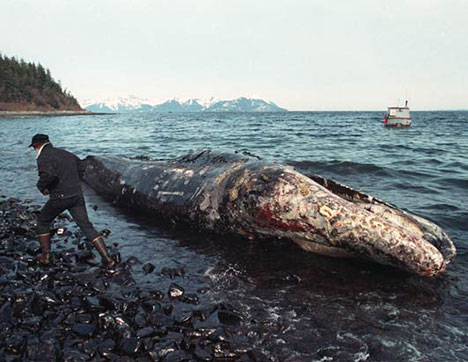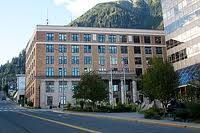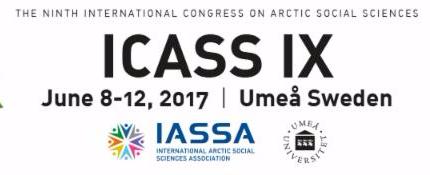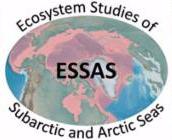|
|
|
|
|
|
|
|
** New this week ** Climate Change Damages to Alaska: Public Infrastructure and the Economics of Proactive Adaptation, Today (12-1 pm, Webinar). Climate change in Alaska is causing widespread environmental change that is damaging critical infrastructure. As climate change continues, infrastructure is expected to become more vulnerable to damage, increasing risks to residents and resulting in large economic impacts. In this study, NOAA quantified potential economic damages to Alaska public infrastructure resulting from climate driven changes in flooding, precipitation, near-surface permafrost thaw, and freeze-thaw cycles under relatively high and low climate scenarios. NOAA also estimated coastal erosion losses for villages known to be at risk. Our findings suggest that the largest climate damages will result from flooding of roads followed by substantial near-surface permafrost thaw related damage to buildings. Proactive adaptation efforts as well as global action to reduce greenhouse gas emissions could considerably reduce these damages. This event is part of the National Oceanic and Atmospheric Administration (NOAA) National Center for Environmental Information OneNOAA Science Seminars. The OneNOAA Science Seminar Series are the most complete and integrated summary of NOAA-wide science and climate seminars. |
Nunavut Water Reservoirs at Risk of Running Dry, Researchers Say. Water reservoirs in some Nunavut communities could run dry over the next decade due to shifting weather and climate patterns, a group of environmental researchers have found. In their study, the researchers sound the alarm on access to fresh water in Nunavut, saying Iqaluit alone could exhaust its freshwater supply within the next five to 10 years. Iqaluit's end-of-winter supply could be completely used up in any given year, said York University geographer Andrew Scott Medeiros, during the period before the ice melts when the supply has already been drained and no more rain or run-off can enter the system. Nunatsiaq Online
 Nunavut Scores Lowest Grade in Canada Food Report Card. Nunavut Scores Lowest Grade in Canada Food Report Card. Many Nunavut residents go hungry, confirms a food report card for Canada that gives the lowest grade possible to Nunavut-a D-for poor performance in making sure its residents get enough food. Most Canadians consume significantly more food than they need, said the Conference Board of Canada, in its introduction to the recently-released Canada Food Report Card. But that's not the case in Nunavut, where moderate to severe food insecurity-or a lack of food-affects more than one in three Nunavut residents and one in two Nunavut Inuit. Nunatsiaq Online Yegor Borisov Orders to Develop a Strategy for the Comprehensive Development of Yakutia's Arctic Territories Until 2030. The head of Sakha (Yakutia), Yegor Borisov, instructed the regional government to develop and submit for approval by April 2018 a draft strategy for socioeconomic development of the Arctic zone for the period until 2030, his press office reports. The activities will embrace the Abyisky, Allaikhovsky, Anabarsky, Bulunsky, Verkhnekolymsky, Verkhoyansky, Zhigansky, Momsky, Nizhnekolymsky, Oleneksky, Srednekolymsky, Ust-Yansky and Eveno-Bytantaysky districts. Local governments of the Arctic districts are recommended to take part in the project's development. The Arctic  Oil Eating Bacteria Struggles in Cold Temperatures- Raises Dangers of Deepwater Disaster in Arctic Circle. Oil Eating Bacteria Struggles in Cold Temperatures- Raises Dangers of Deepwater Disaster in Arctic Circle. According to new research, the temperatures in the deep waters of the North Atlantic would significantly hamper the ability of the bacteria to help the ocean recover from a major spill. In the first study of its type, scientists at the University of Aberdeen have tested the ability of oil-degrading microorganisms found in deep water sediments west of Shetland, which is home to several major oil fields. Microorganisms found in the ocean played an important role in breaking up millions of gallons of oil that spilled into the Gulf of Mexico as a result of the Deepwater Horizon disaster in 2010. Energy Voice Icebreaker Program Moving Fast Than Glacial Pace. President Trump's 2018 budget request submitted Tuesday would continue fast-track development of a new icebreaker, a potential market for Huntington Ingalls Industries' Gulf Coast shipyard. The proposed $19 million comes on the heels of last week's congressional hearing where Coast Guard Adm. Paul Zukunft received positive signals from lawmakers about funding more ice-breaking ships. The commander-in-chief sounded bullish about more icebreakers in his May 17 commencement address at the Coast Guard Academy in New London, Conn. The Daily Press  Alaska House Calls for More Stringent Measures on Vessels in Bering Sea. Alaska House Calls for More Stringent Measures on Vessels in Bering Sea. Vessel traffic in the Bering Sea is the focus of a new resolution that passed through the Alaska House of Representatives with a vote of 33-6 on May 16. One of the sponsors of House Joint Resolution 19 is District 40 Rep. Dean Westlake. "In a nut shell, what we are looking at is knowing who is out there, which way they're going, their speed," Westlake said. "We're trying to keep everyone in their own lane if you will." KTOO
|
|
Future Events
 Ninth International Congress of Arctic Social Sciences: People and Places (ICASS IX), June 8-12, 2017 (Umea, Sweden). ICASS IX's theme is People & Place. Research on social sciences and humanities have a great responsibility to address the challenges for sustainable development in the Arctic, with a specific focus on the many different parts of the Arctic and the people that live there. The multiple Arctics have lately been addressed by many policy makers and researchers. The purpose is often to counteract the stereotypic understanding of the Arctic too often represented by icebergs and polar bears. A focus on people and place highlights the many variances across the region in terms of climate, political systems, demography, infrastructure, history, languages, legal systems, land and water resources etc. Ninth International Congress of Arctic Social Sciences: People and Places (ICASS IX), June 8-12, 2017 (Umea, Sweden). ICASS IX's theme is People & Place. Research on social sciences and humanities have a great responsibility to address the challenges for sustainable development in the Arctic, with a specific focus on the many different parts of the Arctic and the people that live there. The multiple Arctics have lately been addressed by many policy makers and researchers. The purpose is often to counteract the stereotypic understanding of the Arctic too often represented by icebergs and polar bears. A focus on people and place highlights the many variances across the region in terms of climate, political systems, demography, infrastructure, history, languages, legal systems, land and water resources etc.
 2017 ESSAS Open Science Meeting on Subarctic and Arctic Science, June 11-15, 2017 (Tromsø, Norway). 2017 ESSAS Open Science Meeting on Subarctic and Arctic Science, June 11-15, 2017 (Tromsø, Norway). This 3rd Open Science Meeting (OSM) is intended to attract an interdisciplinary group of scholars who will be prepared to discuss their research in the Subarctic, in both the North Atlantic and the North Pacific, and the Arctic Ocean. The title of the OSM is Moving in, out and across the Subarctic and Arctic marine ecosystems: shifting boundaries of water, ice, flora, fauna, people and institutions. It will document the changes that have occurred, the processes that led to these changes, and how future changes are likely to further affect these marine ecosystems. It will also to consider the people who depend upon these ecosystems and how they may be able to cope with the changes in the ecosystem goods and services that they derive from these ecosystems. These include the availability of subsistence foods and the opportunity for commercial fishing. Economic and societal pressures on coastal communities and nations will be sought in relation with the ecosystem changes. To put the present day in a longer perspective, the conference will include a session on the paleoecology of people in Subarctic and Arctic regions that were forced to adjust to the changing temperature and sea-ice conditions in the past.
The Wilson Center-Arctic Circle Forum: The United States and Russia in the Arctic, June 21-22, 2017 (Washington, DC USA). In light of recent world media attention towards Russia and the United States, the Arctic Circle and the Wilson Center will host a Forum on the two countries' complicated yet inherently linked role and relationship in the Arctic. The future of the Arctic will be greatly influenced by the actions of the United States and Russia. What are their policies, their plans and their relations with other states in the Arctic and the Asian and European countries seeking an increasing role in the Arctic? High-level representatives, policymakers and experts will gather in the Ronald Reagan Building in Washington, DC, June 21, to address these questions and challenges. This event is co-hosted by Wilson Center and Arctic.
The 2nd Asian Conference on Permafrost, July 2-6, 2017 (Sapporo, Japan). Delegates will participate in state-of-the-art oral and poster presentations in the modern city of Sapporo (host of the 1972 Winter Olympics). Field trips will visit marginal and extrazonal mountain permafrost sites that support unique geo-eco-hydrological features. All aspects of frozen ground research will be covered, from needle ice to deep permafrost, from frozen ground engineering in cities to permafrost on volcanoes, and from links between frozen ground and ancient cultures to present-day outreach. Plan now to enjoy science and engineering, excellent food, and unique field trips in Sapporo.
Co-hosted by U.S. National/Naval Ice Center (NIC) and the U.S. Arctic Research Commission (USARC). A biennial symposium originating in 2001 that focuses on U. S. naval operations and national strategic issues in an "ice-free Arctic." This symposium brings together nationally and internationally recognized experts on Arctic observations, climate change, and maritime operations. Confirmed speakers include USCG Commandant Paul Zukunft
and Alaska's Congressman Don Young.
As the Symposium is organized jointly by two leading Research Institutes of Russian Academy of Science - Institute of Water Problems and Melnikov Permafrost Institute, particularly the contributions on following research topics are welcome:
- Observational evidences of change in coupled permafrost-hydrology system.
- Present state and future projections of local, regional and pan-Arctic hydrology.
- Modeling studies representing landscape evolution, dynamics of water storages and permafrost degradation.
- Impacts of permafrost hydrology changes on local communities.
VII International Conference on Cryopedology, August 21-25, 2017 (Yaktsk, Russia). The conference will be hosted by the Institute for Biological Problems of the Cryolithozone of the Siberian Branch of the Russian Academy of Sciences (SB RAS). Plenary reports will be organized in the hall of the Academy of Sciences of the Sakha (Yakutia) Republic. The official languages of the conference are English and Russian (with translation). All technical facilities (projectors, computers, video sets) will be available during the conference for presentation of papers. Additional information will be available soon. See the Facebook page here.
 2017 University of the Arctic Rectors' Forum and Conference, August 27-29, 2017 (Aberdeen, Scotland). This conference will also consider how northern scholarship can add to discussions on the North into broader terrains of intellectual engagement. In so doing, it will challenge dominant paradigms of research in both the natural and the social sciences, above all by calling into question the very separation of the world of nature from that of human society which underwrites the distinction between these two branches of scientific inquiry. In its place the conference will seek to forge a new practice of interdisciplinary research, done in collaboration with northern residents and on their terms, which recognizes that every discipline is itself an ongoing conversation, or a way of knowing, rather than a compartment within an overarching, hierarchically organized system of knowledge. Conversations from the North will, then, help to generate a science that is more open-ended, responsive to environmental variation and respectful of the wisdom of inhabitants. 2017 University of the Arctic Rectors' Forum and Conference, August 27-29, 2017 (Aberdeen, Scotland). This conference will also consider how northern scholarship can add to discussions on the North into broader terrains of intellectual engagement. In so doing, it will challenge dominant paradigms of research in both the natural and the social sciences, above all by calling into question the very separation of the world of nature from that of human society which underwrites the distinction between these two branches of scientific inquiry. In its place the conference will seek to forge a new practice of interdisciplinary research, done in collaboration with northern residents and on their terms, which recognizes that every discipline is itself an ongoing conversation, or a way of knowing, rather than a compartment within an overarching, hierarchically organized system of knowledge. Conversations from the North will, then, help to generate a science that is more open-ended, responsive to environmental variation and respectful of the wisdom of inhabitants.
- Small and off-grid community energy solutions
- Oil and gas development
- Renewable energy
- Regulation and Financing
- Transportation and transmission
The AES is a multi-disciplinary event expected to draw several hundred industry officials, scientists, academics, policy makers, energy professionals and community leaders together to collaborate and share leading approaches on Arctic energy issues.
2017 Arctic Circle Assembly, October 13-15, 2017 (Reykjavik, Iceland). The annual Arctic Circle Assembly is the largest annual international gathering on the Arctic, attended by more than 2000 participants from 50 countries. The Assembly is held every October at the Harpa Conference Center and Concert Hall and is attended by heads of states and governments, ministers, members of parliaments, officials, experts, scientists, entrepreneurs, business leaders, indigenous representatives, environmentalists, students, activists and others from the growing international community of partners and participants interested in the future of the Arctic.
 Polar Law Symposium 2017 and Rovaniemi Arctic Spirit, November 13-16, 2017 (Rovaniemi, Finland). The purpose of the Polar Law Symposium is to examine, in detail, the implications of the challenges faced by the Polar Regions for international law and policy and to make recommendations on appropriate actions by states, policy makers and other international actors to respond to these emerging and re-emerging challenges. The Rovaniemi Arctic Spirit Conference is integrated with the Polar Law Symposium, which will be organized by the Northern Institute for Environmental and Minority Law at the Arctic Center of the University of Lapland. Polar Law Symposium 2017 and Rovaniemi Arctic Spirit, November 13-16, 2017 (Rovaniemi, Finland). The purpose of the Polar Law Symposium is to examine, in detail, the implications of the challenges faced by the Polar Regions for international law and policy and to make recommendations on appropriate actions by states, policy makers and other international actors to respond to these emerging and re-emerging challenges. The Rovaniemi Arctic Spirit Conference is integrated with the Polar Law Symposium, which will be organized by the Northern Institute for Environmental and Minority Law at the Arctic Center of the University of Lapland.
ISAR-5 Fifth International Symposium on Arctic Research, January 15-18, 2017 (Tokyo, Japan). The fifth ISAR has been planned at the recommendation of the science steering committee of ISAR-4, which was held in Toyama, Japan in April 2015. The fifth ISAR will be devoted to discussions on environmental changes in the Arctic and their regional and global implications, to seek additional international scientific collaboration in this area by gathering, synthesizing and sharing information related to these changes occurring in the Arctic. Special emphasis will be placed on the fields of the social sciences and humanities, which were not included in the previous ISARs. ISAR-5 will consist of general sessions and special sessions. The general sessions will address the following topics: atmosphere; ocean and sea ice; rivers, lakes, permafrost, and snow cover; ice sheets, glaciers, and ice cores; terrestrial ecosystems; marine ecosystems; geospace; policies and economy; and social and cultural dimensions. Special sessions will be solicited on cross-cutting themes.
 POLAR 2018, June 15-27, 2018 (Davos, Switzerland). POLAR2018 is a joint event from the Scientific Committee on Antarctic Research (SCAR) and the International Arctic Science Committee (IASC). The SCAR meetings, the ASSW and the Open Science Conference will be hosted by the Swiss Federal Institute for Forest, Snow and Landscape Research WSL under the patronage of the Swiss Committee on Polar and High Altitude Research. The WSL Institute for Snow and Avalanche Research SLF is organizing POLAR2018. POLAR 2018, June 15-27, 2018 (Davos, Switzerland). POLAR2018 is a joint event from the Scientific Committee on Antarctic Research (SCAR) and the International Arctic Science Committee (IASC). The SCAR meetings, the ASSW and the Open Science Conference will be hosted by the Swiss Federal Institute for Forest, Snow and Landscape Research WSL under the patronage of the Swiss Committee on Polar and High Altitude Research. The WSL Institute for Snow and Avalanche Research SLF is organizing POLAR2018.
|
|

  
4350 N. Fairfax Drive, Suite 510
Arlington, VA 22203, USA
External links in this publication, and on the USARC's World Wide Web site ( www.arctic.gov) do not constitute endorsement by the US Arctic Research Commission of external Web sites or the information, products or services contained therein. For other than authorized activities, the USARC does not exercise any editorial control over the information you may find at these locations. These links are provided consistent with the stated purpose of this newsletter and the USARC Web site.
|
|
|
|
|
|
|
|
|